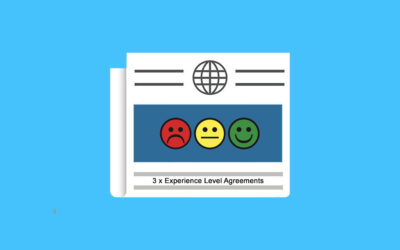A blog for people in organisations.
With useful, first-hand tips from experts.
Feedback as an active leadership tool
Good leadership begins when you don’t assume that someone on your team will eventually say something, but when you actively ask for feedback.
No one could have foreseen that
In the future, many things will be possible that we can hardly imagine today. What methods can help us to see possible futures more clearly?
Leading as a junior product manager
As a junior product manager, you have neither a leadership role nor authority to issue instructions. How can young product managers still lead?
Bridge code chronicle or a C++/CLI experience report
C++/CLI is a Microsoft-specific dialect that extends C++ and bridges the gap between executable C++ code and .NET code. An experience report.
Empathy without ecpathy exhausts managers
Ecpathy is a skill whose impact is often underestimated. What does ecpathy mean for managers and the teams they lead, and why is it important?
Trust & Commit: Responsibility as a management principle
If responsibility is to grow within a team, a clear principle is needed: trust and commit. What does trust mean, and how do you really commit?
25 events for software developers in 2026
At which events in 2026 can software architects and developers learn about technologies and trends? Here you will find a list of events in Germany.
The torch into the future
With the futures cone, you can shine a light from the present into the future. What do you see, and why is it so difficult to classify what you see?
Three typical pitfalls as a manager
Typical pitfalls make it often difficult for managers to work effectively with their teams. How can leadership be systematically effective?
When the future appears at Christmas
Christmas – a time to reflect on the recent past, a time for a story with three ghosts and a glimpse into different versions of the future.
Impulses for organisations – Part 17
The pointless repetition of activities, the blind spot in feedback, and meaningful work with goals. Three new impulses from three experts.
The bottleneck in digitisation
Many companies are engaged in digitalisation, but the results of the transformation are sobering. This is often due to a real bottleneck.
Leading with feeling
Feelings shape how we perceive situations, interact with each other and act. How can they consciously help us when working with teams?
AI and PO: Partnership instead of competition
The role of product owner is interpreted differently in many organisations. Now AI is entering the stage. How can AI and PO form a partnership?
How AI is changing requirements engineering
Artificial intelligence is rapidly changing requirements engineering. In which activities can AI provide support, and how reliable are the results?
Generational change: turning point in family business
The generational change is much more than a strategic or organisational step. What challenges need to be overcome and what tips help in practice?
5 excellent service providers for software development
Are you looking for an excellent software development service provider? Competent, experienced and reliable? Here are five recommendations!
From a culture of error to a culture of support
If you want to establish a culture of support within your organisation, what considerations are important? And what are the benefits of doing so?
Agile transformations rarely fail by chance
There are good reasons why agile transformations rarely run smoothly. WIIFM offers a clever approach to increasing acceptance and impact.
The interest on technical debt
Technical debt incurs interest. How and why does it arise, what role will AI play in the future, and how should organisations ideally deal with it?
The implementation of a source generator
How do you implement a source generator, what obstacles can arise in the process, and how do you overcome them? A practical report.
How to measure corporate culture …
Corporate culture is not about numbers, it is about behaviour. So how can it be measured and made visible and truly useful in practice?
Servant leadership under the microscope
How relevant is servant leadership today, where does the concept have its limitations in practice, and why is it worth looking at host leadership?
Working learning gap – good intentions are not enough
Despite good intentions, work and learning are very often seen as opposites. How can the working learning gap be systematically overcome?
Integration test first with Gherkin and Docker
Integration tests show at an early stage whether an application works as a whole. How do integration tests first work with Gherkin and Docker?
‘Our group dynamics are…’ – yet another misunderstanding
Group dynamics are not a disruptive factor, but rather the lifeblood of collaboration. What influences team dynamics and how can they be fostered?
Oh, books with impact!
Time for books with impact. Read 7 recommendations and interviews with the authors about the content, motivation and target groups of their works.
A successful start in product management
Starting in the field of product management presents demanding challenges for young professionals. What skills and competencies are required?
3D visualisation with VTK and Avalonia UI
How can Avalonia UI be combined with the capabilities of VTK, and how can reusable UserControls be integrated smoothly and step by step?
The future belongs to resilient organisations
Resilience is not a state, but a continuous process. How do companies become resilient organisations, and what factors are important in practice?
Happy birthday, Scrum!
The SCRUM Development Process was first introduced 30 years ago. Time to take a trip back to its beginnings and take a look at the present.
Conflicts in employee appraisals
Employee appraisals are not always easy. How can managers prepare for difficult killer phrases and potential conflicts and respond confidently?
Test management in large-scale IT projects
Why is test management often neglected in large-scale IT projects, what misunderstandings exist, and what must a good test concept achieve?
The in-between in transformations
The analysis is complete, the solution is on the table, everyone nods, and then… nothing happens. Welcome to the in-between in transformations.
Creating applications with Avalonia UI
Avalonia UI allows dotnet applications to be made available on various platforms. What are the advantages and how is the setup achieved?
Lateral leadership in everyday working life
Lateral leadership means influence without formal power. How can it be achieved in agile, hybrid and cross-functional teams, and what obstacles are there?
Clarity and orientation in software development
Clarity is a prerequisite for software development. And how do you achieve this clarity? With guidance for greater insight and orientation.
The velocity trap
Does it make more sense to rely on three junior developers or one senior developer? What factors determine velocity, and what pitfalls await?
How effective are AI-supported code reviews really?
AI tools are increasingly being used to perform code reviews. What are the potential benefits and current limitations of these tools? A field report.
Effective teams through synchronous dependencies
When multiple teams are involved in developing the same product, good coordination is crucial. How do synchronous dependencies help with this?
Taiga UI: The highly customisable Angular Material alternative
In the world of Angular development, Angular Material is often the first choice for UI components. When is Taiga UI a suitable alternative?
Scrum Master between effect and ineffectiveness
The tasks and responsibilities of the Scrum Master are clearly defined. When does the role have a real impact, and when is it ineffective?
Labour law in the age of AI
The rapid progress made through artificial intelligence is not only turning processes upside down, but also affecting labour law. An assessment.
Impulses for organisations – Part 16
True leadership tasks, declining interest in taking on leadership positions, and mistakes in freelance pricing. Three impulses from three experts.
Generating unit tests with AI
Can AI really write good unit tests? What are the opportunities and the restrictions? A practical report with ChatGPT, Claude, and Gemini.
How teams become more effective through values
Values provide a framework for working in teams. How can they be clarified in advance before conflicts arise, and which ones are non-negotiable?
Shared services vs. cross-functional teams – a flow perspective
When do shared services or cross-functional teams reveal their strengths? And what does this mean for the structure and work in organisations?
The silence in a transformation
Transformations often give rise to moments of uncertainty and silence. Why is it more prudent to pause and reflect rather than act quickly?
The development of an iOS app with generative AI
What is the best approach for developing an iOS app with generative AI? Where are the pitfalls, and what lessons can be learned?
Self-organised teams, yet everyone still asks the boss
Self-organisation is the order of the day. What limitations are often encountered and how can it be strengthened in the short, medium and long term?
Resignations as a reflection of corporate culture
What mistakes do companies make when employees resign, and how can resignations be handled professionally and empathetically?
The art of performance appraisal
Fair performance appraisal is a major challenge for managers. What are the potential dangers and pitfalls and what practical tips can help?
Multitasking madness in project management
Multitasking is widespread in project management. What problems does this cause and how can you maintain a consistent, efficient focus?
Psychological safety – the invisible booster for successful teams
Psychological safety is the key ingredient for effective teams. What does this mean in practice, and how can it be built into everyday working life?
Breaks: Underrated power tool or waste of time?
If breaks are important and boost energy, creativity and health, why do we take them rarely? A true story of an entrepreneur shows what’s possible.
Software engineering in the AI era
Software engineering is being transformed by artificial intelligence. What does this mean for the role, tasks and competence of software engineers?
Ultimate anti-tips for product owners
You want to get started as a product owner with vigour, motivate your team and develop a fantastic product. These tips will (certainly not) help!
The quiet advance of Voice AI in SMEs
What is voice AI, what are the technology’s application scenarios, what are its advantages, and what aspects should companies consider?
Hoshin Kanri vs. OKR – a comparison
What are the main differences between Hoshin Kanri and Objectives and Key Results (OKR), and how can the two frameworks be combined in practice?
Impulses for Organisations – Part 15
The added value of agile methods, a different form of brand communication and an interactive warm-up format. Three impulses from three experts.
Software security as part of UX
Software security not only protects against attacks, it also shapes the user experience. Which approaches promote the necessary change in perspective?
Forgotten touchpoints in the candidate journey
Many candidate journey concepts end with onboarding. But why is it worth thinking ahead to offboarding, and which touchpoints are important?
Three questions about effectuation
Is effectuation exaggeratedly optimistic, genuinely applicable in practice, and economically even viable? Heiko Bartlog provides answers.
Strategy with the hammer
Many organisations transform structures but do not question the basis of the organisation. Which strategy makes more sense and is more sustainable?
Why don’t employees do what they are supposed to do?
There are reasons why employees don’t do what their superiors expect them to do. How can you identify these reasons and what can you do about it?
Bucket list method: From experience to results
In a changing world of work, people who are reflective, creative and self-effective are in demand. How does the bucket list method help?
How Google could save its business model
Artificial intelligence (AI) is changing the world of work. What does this mean for Google’s business model and global content marketing?
Get out of your comfort zone. Or get in?
‘Get out of your comfort zone!’ is a well-known mantra. But is it really true? Can personal development and learning only take place outside of it?
Knowledge management in transition: concepts for the future
Demographic change is placing greater emphasis on knowledge management in companies. What concepts help to secure and transfer knowledge?
3 myths that ruin your employee appraisal
An employee appraisal opens up perspectives for both parties and helps to improve performance. But which myths prevent a successful dialogue?
A co-creative approach to risk management
What role does risk management play in times of uncertainty, and what methods and approaches exist for implementing it in a co-creative manner?
When recruiting and specialist departments act in unison
A very important position needs to be filled quickly. How can recruiting and the specialist department work together effectively? A field report.
Corporate vs. personal branding – a comparison with an aha effect
What are the differences between corporate and personal branding, and how can companies combine the two in a meaningful way in practice?
The true cost of outdated software
Why outdated software becomes expensive: risks, warning signs and useful strategies to protect companies from standstills and hidden costs.
Employee appraisal? No, thanks!
Annual employee appraisals are still standard practice in many companies. What is the problem with this and what is a sensible alternative?
Three questions about organisational development
Why is organisational development important, how can it be established, and what role does personnel development play? Jo Kristof has answers.
Master Confusion – the silent strategist in the background
Master Confusion works as a strategist behind the scenes, creating wonderful dysfunction in numerous organisations. Time for a fitting tribute.
A picture is worth a thousand words
Pictures present information simultaneously. How are they used in companies, which notations are helpful and where are the potential dangers?
Jira automation with ScriptRunner
What should you do when the standard automations in Jira fall short and processes get more complex? That’s where Jira ScriptRunner comes in.
Making mentoring effective
Mentoring is a recognised method for the individual development of people in different phases of their career. What makes it really successful?
Agility was just the beginning
Interest in agility is declining in numerous organisations. What are the causes and in which direction is organisational development likely to go?
Three questions about productized services
How to find the right idea and price for a productized service and how it can protect you from bogus self-employment? Maik Pfingsten explains.
Trust destroyers in everyday management
Team trust is not a given. Invisible trust destroyers often cause frustration and conflict without managers noticing or recognising the real causes.
AI and the little white lie
AI applications generate answers and occasionally hallucinate from time to time. However, should companies teach their solutions to lie if needed?
Life-stage oriented leadership
Employees expect flexibility, purpose and a healthy work-life balance – and that also applies to managers. Time for life-stage oriented leadership.
How does real learning work with serious games?
The key to long-term learning is to experience knowledge, not to consume it. What practical contribution can serious games make in this regard?
Inclusive leadership in action
Hierarchical management styles seem to be outdated. What are the benefits of inclusive leadership and how do you become an inclusive leader?
Three questions about the IOSP
What is the Integration Operation Segregation Principle (IOSP), who invented it and why should it be applied? Stefan Lieser has the answers.
Sustainability now more than ever
How do companies that see sustainability as a strategic guideline secure a competitive advantage for themselves, even in a volatile environment?
How often do you take a break?
The art of taking a break is an invisible factor in the success of competitive sports. How can breaks be continuously integrated into our daily work?
From fear to excitement for the future
Many managers and employees are looking to the future with concern. How can curiosity help us to actively shape the future with enthusiasm?
What can the Azure Durable Task Scheduler do?
The orchestration of workflows is a central component of modern software development. How exactly can the Azure Durable Scheduler support this?
Leadership is about directing attention
What does leadership have to do with attention? And what are practical implications for managers, employees and the structures of an organisation?
What makes decisions so difficult?
Do you sometimes find it difficult to make decisions? Perhaps it is psychology that prevents us from making decisions? What can we do about it?
Transfer of knowledge and experience in retirement situations
The imminent retirement of the baby boomers presents companies with challenges in transferring knowledge and experience. What can they do?
Between stress and health
Various factors influence the health of employees. What do the latest figures reveal, what do they mean for companies and what tasks arise from them?
The two faces of self-organisation
Self-organisation is emphasised in many organisations, but what does it actually mean? And why is a differentiated understanding important?
Impulses for organisations – Part 14
More time for self-determined work, hierarchy, power and leadership, and useful alternatives to PowerPoint. 3 new impulses from 3 experts.
OKR pitfalls: Prioritise, but with focus
There are various pitfalls to be aware of when using OKR. One problem, for example, is the loss of focus during the OKR cycle. What tips can help?
Why young and old are stronger together
When old and young meet in organisations, a generational conflict often arises. How can the parties involved really benefit from each other?
What an old Honda says about innovation
Honda’s history shows how innovation is born out of necessity. A journey through time and a description of methods that help with advancement.
Guidelines for company valuation
What are the best methods for company valuation, when is which approach suitable and how can a valuation be carried out with little risk?
Power and self-exploitation
How does power change in organisations when employees start to control themselves and their work? And why is there a risk of self-exploitation?
Goodbye, pressure to succeed
The pressure to succeed usually arises from an inner process that takes place unconsciously within us. How can you recognise and avoid it?
The occupational accident in the company
An occupational accident can happen suddenly at the workplace. What can companies do to minimise risks and how do they prepare for an emergency?
Collaboration with a software partner
When does it make sense to collaborate with a software partner, what practical models are available and which factors can determine success?
Superpower crisis resilience
The ability to overcome crises has become a key skill in today’s world. How can people learn resilience and how can they lead resiliently?
25 events for software developers in 2025
At which events can software developers and software architects find out about technologies and trends? Here you will find a list with 25 events.
6 templates for better collaboration
Good teamwork is an important ingredient for a successful undertaking. Get to know 6 templates that help to improve collaboration in a simple way.
Self-care: no more feeling guilty
Self-care is neither a luxury nor a reason to feel guilty. How can we integrate it into our day-to-day life and what practical approaches can help?
Keep Manager: Everything stays different
The sheer number of changes in organisations is often a major challenge for employees. How can a keep manager help against change fatigue?
Colocation as a driver for digital transformation
What is colocation, why are more and more companies using colocation services and how are they sustainably driving their digital transformation?
Oh, precious books
Are you looking for a selection of books worth reading? Here you will find a compilation of precious books with short interviews with the authors.
The language of appreciation
What does appreciation mean in the workplace and how do you recognise it? And what happens when managers value different things than employees?
Training management in healthcare IT projects
How can a well-thought-out concept improve training management in clinical projects and which modern learning methods are particularly effective?
Slicing Work – Essential skill for agility
Slicing work – the division of labour – is an important skill in organisations and for agility. What types are there and when is each useful?
Three questions about experience level agreements
Do experience level agreements (XLA) replace SLA? How can they be introduced and integrated into outsourcing contracts? Dierk Soellner has the answers.
Farewell as a leadership task
Dismissals are never easy for those involved. This is a guide for managers on how to handle farewells professionally, fairly and empathetically.
Impulses for organisations – Part 13
Lies in companies, the interaction between customers and software agencies, and the challenges of growing companies. 3 new impulses from 3 experts.
Disaster relief as a model for corporate crises
Overcoming corporate crises like disaster relief: What companies can learn from crisis professionals to remain resilient and capable of acting.























































































































